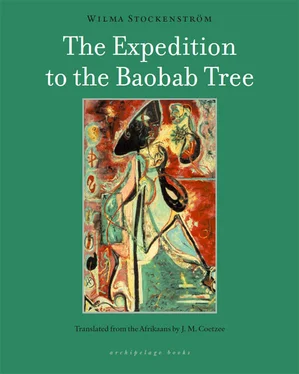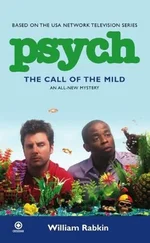After the warthogs have grazed, a novice combs the patch of veld where experts have rooted, she kneels like them, tries to pierce the hard ground with a stick where she lacks tusks, tries using her eyesight to search out where she is not endowed with a sense of smell attuned to edible bulbs and roots, and dejectedly comes away with no more than a handful. After the baboons have grazed, the same procedure, except that she makes quite sure that they are out of the way before she ventures onto their terrain.
I fear the baboon’s grimace more than the tusks of warthog and bushpig. He is too much like me. I fear my recognizable self in his ugly face. I am reminded of my inferior position here, my lesser knowledge. I feel taunted by the mirroring of my moods and desires in his monstrousness and feel ridicule of my refinement, a demonstration that it is superfluous, in this vulgar hands-and-knees caricature. I despise him, his strength, his cunning, his self-evident mastery of this world. I despise the baboons one and all. The gluttons with the fat cheeks, they revolt me. Their unsightly public coupling and the self-abasing begging of the females, the ducking of the females under the hard hands of the males and the raucous scolding, and the eyes close together as you find them in brutes, and I think it is a sign of greed as well. I know too much about them for my taste. In a cage I would be able to laugh at them. As for what they know about me, they reveal nothing in those sidelong glances. I suppose I am no more than a nuisance to them. An outsider, far outside their realm of activity.
Only when I am asleep do I know fully who I am, for I reign over my dreamtime and occupy my dreams contentedly. At such times I am necessary to myself.
It was in a hurried flight from the sentry of a troop of sickle tails that I came upon a flattened patch — it looked flattened to me — and stumbled and sprawled and gasped for breath. I turned around. My heart beat down to my fingertips. The puffs of breath from my nostrils blew against quivering blades of dry grass.
Thus I lay for a long while with the resignation of a food scavenger to whom hunger is something familiar that can wait to be stilled. Then I saw something shining, little beads of light between my eyelashes shone green and black, the light turned to solid beads when with the tip of my finger I burrowed between the grass blades and touched them. Then I sat up and scratched the beads out of the dust and the dry roots. They lay on my palm, two black and one green. I carried the useless discovery to the tree.
They were as small as pollen. I examined them. I arranged them in the limited number of patterns that their number and colors allowed. I recognized them. The next day I wanted to return to the place where I found them, but the direction escaped me and aimlessly I searched, hoping that I would recognize a tree or a rock slope, for it was near a koppie, that I remembered, and I remembered the white stepladder of roots that a mountain fig had woven up against a rockface; but I found nothing. I roamed about in the veld as if I had not yet forced any system upon it, just like at the beginning when I arrived here.
Right at the beginning was no time, for there was no time to devote to sequence and there were no categories, since the scrabble to survive wiped these differences out. Now I can permit myself the luxury of classification, as well as a judicious application of old and newly acquired knowledge. I can even reflect on what I am doing. I can let my thoughts run consecutively and regularly, without waves or ripples, I can form my thinking round as a clay pot and set it down cool and precise as water, I can make the mouth of the clay pot stand out like a spout against the uncertainty of blue and of black air that penetrates me and fills me completely if I am not careful. And I fill my thoughts with all sorts of objects, endless row upon row, not to be counted, I thank providence, I can think of enough objects to obliterate everything, and in addition I can make up objects if the remembered ones run out. I have good remedies against being empty.
Here now, the little beads that do not require imagining and of a kind that I used to see hanging around the necks and wrists of men and women. Once they used to be accepted in exchange for things, just as I was accepted in exchange for something. Of course I have no idea what my value must have been or what it ever was. A piece of ring money. Countless pieces. Another area of which I have little knowledge is the expenditure of money. It was the privilege of a slave girl to have everything given to her. The roof over my head. The cloth around my body. The food — in my case, plenty of it. How happy I was.
The beads are so tiny that they are barely visible on the knot in the tree where I keep them; but with my eyes shut I would be able to pick them up. I know the interior of my tree as a blind man knows his home, I know its flat surfaces and grooves and swellings and edges, its smell, its darknesses, its great crack of light as I never knew the huts and rooms where I was ordered to sleep, as I can only know something that is mine and mine only, my dwelling place into which no one ever penetrates. I can say: this is mine. I can say: this is I. These are my footprints. These are the ashes of my fireplace. These are my grinding stones. These are my beads. My sherds.
A supreme being I am in my grey tree skin. When I appear in the opening I stand proudly. Afterwards I suspect that I pose in the easily cultivated attitude of apparently relaxed expectation that I learned to adopt before my owners, mindful of the advantage of making an impression and at the same time beneath the surface brimming with conceit because I held this tiny scrap of power.
But imperiously I stand now and gaze out over the veld, and every time I step outside the world belongs to me. Every time I step out from the protecting interior of the tree I am once again a human being and powerful, and I gaze far over the landscape with all its flourishes of vegetal growth and troops of animals and the purple patches of hills that try to hedge it in on the horizon. Reborn every time from the belly of the baobab, I stand full of myself. The sun defines my shadow. The wind clothes me. I point to the air and say: air make me live. And when the scrub warbler calls, he calls in my name. I am all there is, he calls.
Not everything is I. No. If there are still people here. Not everything.
How trifling the beads I have discovered compared with those I wore earlier, great oval red and yellow glass beads that hung like ripe berries around neck and wrists, complementing the ivory of a bracelet around my upper arm and my silk gown printed in shades of yellow. I was radiant. I laughed whitely. I was an object to be shown off, gloriously young as I first was. My marklessness, my smoothness, my onetime wholeness of skin. I was the envied uncircumcised one. I was the desired. I was too young to care in the slightest, to say nothing of understanding. I was a child. Such a child, such a child. I was still a child when I carried a child inside me.
Thankfully I remember the women who with their soothing gestures broke me in. Only here and there did I catch a reference, an intonation or an emphasis, for they spoke a language that poured down around me like a waterfall, it fell and fell from their mouths. Who were these women who adopted me and mothered me and taught me the game with men? I was overloaded with gifts to make me attractive. At the time I thought them gifts. I clamped myself fast to the women and tried to be good. Sometimes they scolded me. Then their lips opened and there was a creaking and crackling. But my tears were kissed away, they gave a clatter of friendly laughter, picked me up on their laps, pressed me to them, and I loved them like a child who once again feels safe; I climbed from lap to lap and jingled their bracelets. Thus, playing with me, they taught me, so that eventually I would remember the rapture and the torment, but inwardly remain untouched, remain whole, remain myself. I call you up in my memory. I cannot remember your faces but that does not matter. I remember your wonderful affection. I wonder whether you are now old and sad, and whether you still live in that house that was your destination, and whether you remember me, one of the multitude entrusted to your special soft playful care, and whether you ever tried to find out what happened to all of us. Whether you minded.
Читать дальше












